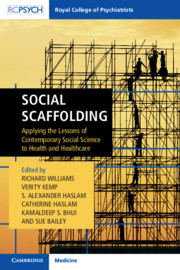Book contents
- Social Scaffolding
- Social Scaffolding
- Copyright page
- Contents
- Contributors
- Foreword
- Note
- Section 1 Schooling
- Section 2 Scoping
- Section 3 Sourcing
- Chapter 15 Crowds and Cooperation
- Chapter 16 Emergencies, Disasters and Risk Reduction: A Microcosm of Social Relationships in Communities
- Chapter 17 Shared Social Identity in Emergencies, Disasters and Conflicts
- Chapter 18 Complex Trauma and Complex Responses to Trauma in the Asylum Context
- Chapter 19 The Mental Health of Veterans: Ticking Time Bomb or Business as Usual?
- Chapter 20 Violent Radicalisation: Relational Roots and Preventive Implications
- Chapter 21 Ways Out of Intractable Conflict
- Chapter 22 Agency as a Source of Recovery and Creativity
- Section 4 Scaffolding
- Section 5 Sustaining
- Index
- References
Chapter 21 - Ways Out of Intractable Conflict
from Section 3 - Sourcing
Published online by Cambridge University Press: 14 June 2019
- Social Scaffolding
- Social Scaffolding
- Copyright page
- Contents
- Contributors
- Foreword
- Note
- Section 1 Schooling
- Section 2 Scoping
- Section 3 Sourcing
- Chapter 15 Crowds and Cooperation
- Chapter 16 Emergencies, Disasters and Risk Reduction: A Microcosm of Social Relationships in Communities
- Chapter 17 Shared Social Identity in Emergencies, Disasters and Conflicts
- Chapter 18 Complex Trauma and Complex Responses to Trauma in the Asylum Context
- Chapter 19 The Mental Health of Veterans: Ticking Time Bomb or Business as Usual?
- Chapter 20 Violent Radicalisation: Relational Roots and Preventive Implications
- Chapter 21 Ways Out of Intractable Conflict
- Chapter 22 Agency as a Source of Recovery and Creativity
- Section 4 Scaffolding
- Section 5 Sustaining
- Index
- References
Summary
With some exceptions, people who grew up in the 1960s in the USA and Western Europe became used to a world on a fairly continuous trajectory of economic development, political stability and physical security. They were then joined by an increasing number of other states in the old Soviet bloc, in South Asia and in Latin America, which were becoming more democratic, stable, prosperous, peaceful and relatively free. It has been a profound shock to see all of this change. Questions about what creates and sustains intractable violent conflict and how it may be possible to find ways out of it, have not been so relevant in the lifetime of most of the people reading this book as they are now.
- Type
- Chapter
- Information
- Social ScaffoldingApplying the Lessons of Contemporary Social Science to Health and Healthcare, pp. 196 - 204Publisher: Cambridge University PressPrint publication year: 2019



